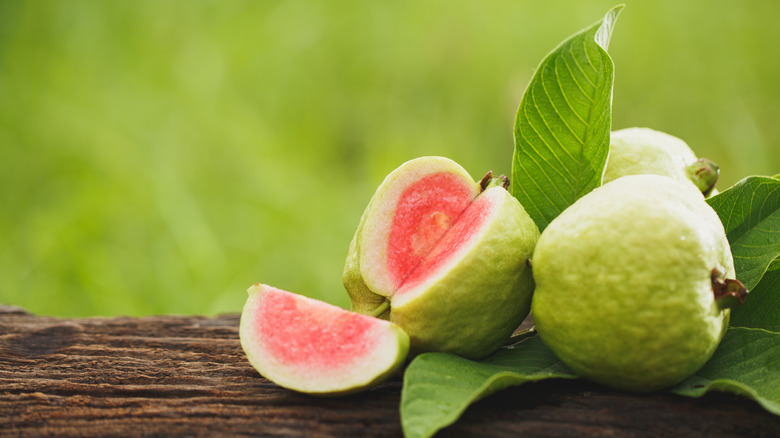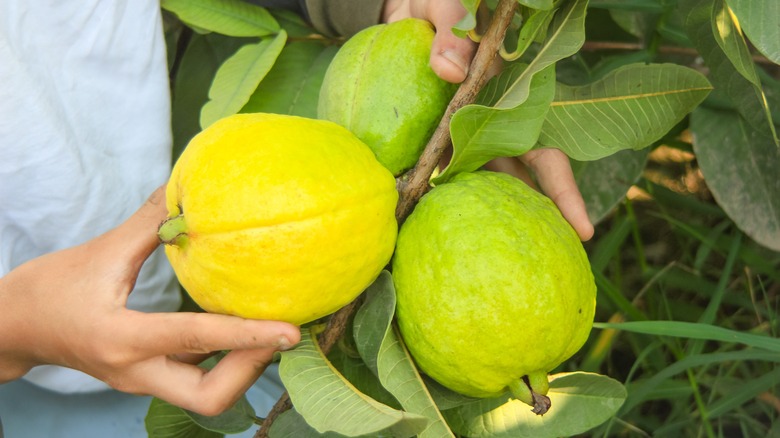The Tropical Fruit That Has The Most Amount Of Protein
Fruits are commonly associated with fiber, vitamins, and potassium. When it comes to protein, we naturally turn toward meat and eggs; or, if you're on a plant-based diet, foods like beans, chickpeas, broccoli, or nut butter. If you thought you knew everything you wanted to know about protein, however, you might be wrong. There are also tropical fruits that pack a punch when it comes to protein, one of which is the humble guava.
If you've ever looked into the history of this juicy and sweet fruit, you'll know that there are over 100 types of guavas in the world. Mexico, the Caribbean, Central America, and South America are typically credited with their origins; but guava trees can be seen in different parts of the world now, including the tiny South Asian island of Sri Lanka.
Their interior flesh color can vary from milky white to bright pink, depending on what kind of guava it is; and they are edible in their entirety — seeds, skin, flesh, and all. All you have to do is pluck them from a tree, wash them, and consume them.
For a fruit, guava has a considerably high amount of protein, with just one cup (165 grams) providing 4.2 grams of protein. But that's not all the nutritional goodness that it contains.
Guava has other nutritional benefits, too
With fruit, more often than not, fiber is always a plus and this tropical fruit doesn't disappoint. According to double-certified integrative nutrition health coach Edie Horstman (via Camille Styles), "This tropical fruit is also high in vitamin C and fiber."
One cup (165 grams) of guava contains 1.6 grams of fat, 23.6 grams of carbs, 8.9 grams of fiber, 688 milligrams of potassium, and 376 milligrams of vitamin C. Even though the fruit does contain 14.7 grams of naturally occurring sugar, guava is ranked low for fruit on the glycemic index with a rating of 12-24, which means it won't majorly spike your blood sugar levels.
One of the struggles for plant-based eaters is the search to add sufficient protein to their diet. If you're thinking, however, that guava is a good standalone source of protein, you may want to think again. As explained by functional medicine registered dietitian, Brigid Titgemeier (via Well+Good), when it comes to fruit, in order to get the recommended amount of protein your body needs, you will need to consume lots of it and this puts you at risk of increasing your carbohydrate content which again influences your blood sugar levels. Healthy as they are, there is such a thing as eating too much fruit.
How to incorporate guava into your diet
Per Titgemeier, tropical protein-rich fruits like guava are a great addition to an already strong plant-based diet for vegans and vegetarians. She suggests trying it cubed on top of a Greek yogurt bowl with chopped nuts for a protein-packed breakfast combo. Or just bite into it like you would an apple.
Even for those who don't follow a plant-based diet, guavas are a smart choice of fruit for when you want to satisfy a sweet craving after a meal. Your activity level, age, weight, and other factors determine how much protein you need per day, but protein-rich fruits are great for those times when you want to mix things up and add other textures and flavors to your diet. There's everything from guava jam and guava-infused meat marinades to even guava mojitos. "Enjoy guava as a refreshing snack or incorporate it into your smoothies, salads, or even make a homemade guava jam or jelly," shared certified nutritionist Amy Fox with Real Simple. If you follow a healthy diet, however, you may want to steer away from the guava recipes with added sugar.
Also, it turns out guava isn't the only fruit that's high in protein. Jackfruit — another tropical fruit grown in Asia, Africa, and South America — is also a good source of protein. Other fruits to consider include avocados, apricots, blackberries, kiwi fruit, oranges, and bananas, according to Live Science.



